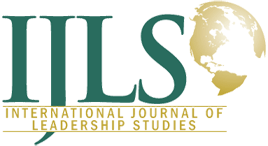Seokhwa Yun, Jonathan Cox, Henry P. Sims, Jr., & Sabrina Salam
This study examined how leadership related to citizenship behavior within teams.
Leadership was hypothesized to influence team organizational citizenship behavior (TOCB)
either directly or indirectly through job satisfaction. Longitudinal data were collected
in three waves. Leader behaviors were measured at time 1, follower job satisfaction
at time 2, and TOCB at time 3. Results indicate that both empowering and transformational
leadership related positively to TOCB through job satisfaction. Aversive leadership was
related negatively to TOCB. Also, leadership was mediated by job satisfaction in negatively
relating to team anticitizenship behavior. The implications and directions for future
research are discussed.
[read the full article: "Leadership and Teamwork: The Effects of Leadership and Job Satisfaction on Team Citizenship"]
Wendelin Küpers
The paper proposes a framework for the integration of leadership and followership.
An integral orientation considers that leadership is constitutively linked with
followership and vice versa. Facing the diversity of approaches and theories in both
fields, a comprehensive conceptualization is presented that is suited to investigating
complex, interrelated processes of leading and following. Based on a holonic understanding,
integral perspectives cover the interdependent subjective, intersubjective, and objective
dimensions of leaders and followers; respectively, leadership and followership within a
developmental perspective. Based on an integral orientation, further processual and
relational dimensions are discussed by which mutually interwoven leadership/followership
can be understood as an emerging event, embedded within an ongoing, interrelated nexus.
Finally, the paper outlines some theoretical and methodological implications and perspectives
for future research of an integral leadership and followership.
[read the full article: "Perspectives on Integrating Leadership and Followership"]
Benjamin Paul Dean
Transnational or global partnerships and intercultural strategic alliances require
organizational leaders who will proactively engage risk and establish initial trust
at the earliest stage of the emerging new relationship, especially where the prospective
partnership must overcome a hostile external environment in which risk is high. Recent
models of trust have emphasized the importance of trusting behavior that occurs early
in the relationship. The model proposed by Jarvenpaa, Knoll, and Leidner (1998) refers
to such early behavior as trusting action. Trusting action resembles a form
of emergent trust or trust ex ante, similar to swift trust. This case study
considers a new transnational partnership between two faith-based nonprofit charitable
organizations—one in Iraq and the other in the United States. The study reports how
risk-taking behavior and trusting action by leaders overcame a hostile, low-trust
environment to create the intercultural relationship of trust essential to forming a
strategic alliance. The findings support Jarvenpaa et al.'s proposition that initial
trusting action functions both directly as a nontraditional antecedent of trust and
indirectly by enhancing other antecedents. A need remains for additional case studies
on how leadership initiatives can strategically employ mechanisms and interactions of
early trusting behaviors to expedite such partnerships and alliances.
[read the full article: "Initiating Trust in a Hostile Environment: A Case Study of Leaders Forging a New Transnational Partnership in Iraq"]
Sanghan Choi
Since leadership plays a vital role in democratic movements, understanding the nature
of democratic leadership is essential. However, the definition of democratic leadership
is unclear (Gastil, 1994). Also, little research has defined democratic leadership in
the context of democratic movements. The leadership literature has paid no attention
to democratic leadership in such movements, focusing on democratic leadership within
small groups and organizations. This study proposes a framework of democratic leadership
in democratic movements. The framework includes contexts, motivations, characteristics,
and outcomes of democratic leadership. The study considers sacrifice, courage, symbolism,
citizen participation, and vision as major characteristics in the display of democratic
leadership in various political, social, and cultural contexts. Applying the framework
to Nelson Mandela, Lech Walesa, and Dae Jung Kim; the study considers them as exemplary
models of democratic leadership in democratic movements for achieving democracy. They
have showed crucial characteristics of democratic leadership, offering lessons for
democratic governance.
[read the full article: "Democratic Leadership: The Lessons of Exemplary Models for Democratic Governance"]
Punam Sahgal & Anil Pathak
This study uses a developmental perspective to study transformational leadership in
the Indian context. It focuses on significant life experiences that have shaped leaders
who have successfully transformed organizations. The personal experiences shared by
leaders offer valuable insights on the role of family and childhood experiences that
have had a sustained impact on their lives. The paper suggests that leaders do not
emerge as a consequence of events or incidents but a journey of distinctive life
experiences and processes. It concludes with a framework that weaves the antecedents
of leadership that have enabled leaders to accomplish professional growth and success.
[read the full article: "Transformational Leaders: Their Socialization, Self-Concept, and Shaping Experiences"]
